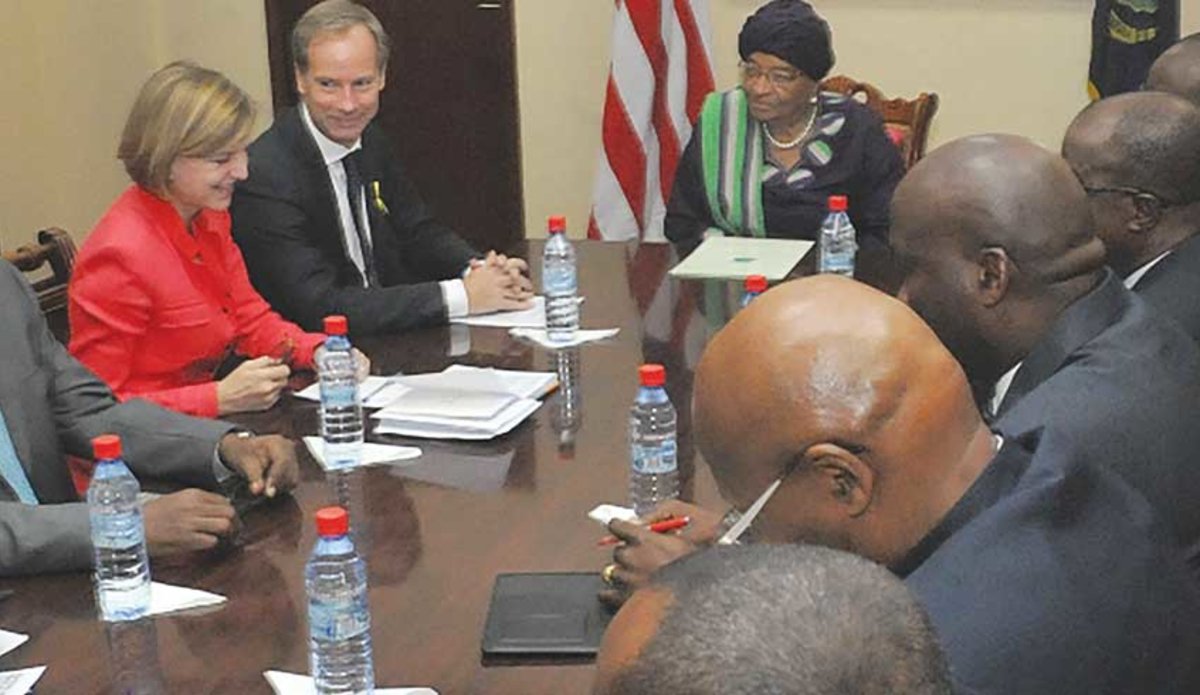Top UN Envoy Assesses Peacebuilding Priorities in Post-Ebola Liberia
To gain firsthand knowledge of peacebuilding priorities in Liberia in the wake of the Ebola outbreak, and as the United Nations peacekeeping mission in the country scales down its security presence, the Chair of the United Nations Peacebuilding Commission (PBC), Ambassador Olof Skoog, visited Liberia early April this year. He toured peacebuilding initiatives and interacted with top government officials, development partners, civil society and local community leaders engaged in the peacebuilding project.
“The idea is to mobilize international support for Liberia to have peacebuilding high on the agenda as the UN Mission in Liberia [UNMIL] continue its reductions,” the PBC Chair said, pointing out the need for the international community “to cooperate and accompany Liberia to sustain its peacebuilding structures.”
The PBC is an intergovernmental advisory body that supports peace efforts in countries emerging from conflicts, mobilizing relevant actors and resources and proposing strategies for post-conflict recovery and peacebuilding. Liberia and its fellow Ebola-struck neighbors Guinea and Sierra Leone, together with Guinea Bissau and the Central African Republic are the post-conflict states currently under the care of the PBC.
I am even more pleased about the way you, Madam President and your Government handled the Ebola crisis...
In Bong County, the PBC Chair saw the key propellers of Liberia’s peacebuilding process, the Gbarnga Regional Justice and Security Hub, the first of the five command-and-control centres conceived to devolve justice and security services to all parts of the country.
Hub Manager Hezekiah Siakor briefed Ambassador Skoog on the operations of the centre, citing the rapid deployment of the hub-based Police Support Unit to various parts of the region to quell looming tensions as a major achievement of the centre. Siakor singled out lack of logistics, uniforms and accoutrements for security and inadequate budget as some of the challenges facing the centre.
Ambassador Skoog hailed the hub concept saying it had bridged the missing gap in the administration of justice in Liberia. “I think it’s doing an important job here, providing security and safety outside of Monrovia to the people in the counties; I believe that has been missing for many years,” he noted, adding that there remains “a lot of work to be done to make this sustainable.”
The highlight of the PBC Chair’s three-day visit was a meeting with President Ellen Johnson Sirleaf during which the two shared ideas on the effective way of positioning Liberia’s post-Ebola recovery programme to complement and sustain the country’s peacebuilding efforts. Ambassador Skoog commended the Liberian President on the exceptional leadership she and her government exhibited during the Ebola crisis.
“I am even more pleased about the way you, Madam President and your Government handled the Ebola crisis, and wish to extend sympathy and condolence on behalf of the Peacebuilding Commission for the lives lost and the pains endured,” he told the Liberian leader, emphasizing the need to use the Ebola recovery process to consolidate peacebuilding in Liberia.
President Sirleaf said Liberia was in the process of implementing a 5-year development plan when the Ebola Virus Disease (EVD) emerged, and would be guided by the lessons from the epidemic as the country forges ahead. “We are keen on copying the elements of success from the Ebola crisis to our current development challenges,” the Liberian leader stated, noting that the three most affected countries are finalizing a Regional Recovery Plan, but Liberia had, as well worked on its own National Economic Recovery Plan that takes into account specific needs of the country.
The World Health Organization (WHO) declared Liberia free of Ebola on 3 Septembet, 2015.
The PBC Chair also met with development partners including ambassadors of the United States, Sweden, United Kingdom, France, Germany, China, Japan, European Union, and the African Union, officials of the World Bank, the International Monetary Fund and the African Development Bank.
The Lofa County city of Zorzor was another important stop for the PBC Chair. Zorzor offered him the opportunity to know more about the Land Coordination Centre, a peacebuilding mechanism put in place to resolve land disputes through the alternative dispute resolution approach. It also gave him the chance to learn about tensions in the community as Zorzor was just emerging from an ethnic feud.
 UN
UN United Nations Peacekeeping
United Nations Peacekeeping





